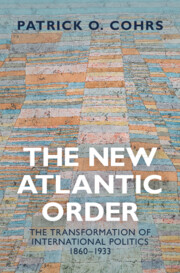Book contents
- The New Atlantic Order
- The New Atlantic Order
- Copyright page
- Dedication
- Contents
- Acknowledgements
- Abbreviations
- Maps
- Introduction
- Part I Inevitable Descent into the Abyss?
- Part II The Greatest War – and No Peace without Victory
- 6 Tectonic Changes
- 7 The Political and Ideological “War within the War”
- 8 No “Peace without Victory”
- 9 No Prospects for a Lasting Peace?
- Part III Reorientations and Incipient Learning Processes
- Part IV No Pax Atlantica
- Epilogue The Political Consequences of the Peace
- Bibliography
- Index
9 - No Prospects for a Lasting Peace?
The Urgent and the Systemic Challenges of Peacemaking and the Need for a New Atlantic Order
from Part II - The Greatest War – and No Peace without Victory
Published online by Cambridge University Press: 22 April 2022
- The New Atlantic Order
- The New Atlantic Order
- Copyright page
- Dedication
- Contents
- Acknowledgements
- Abbreviations
- Maps
- Introduction
- Part I Inevitable Descent into the Abyss?
- Part II The Greatest War – and No Peace without Victory
- 6 Tectonic Changes
- 7 The Political and Ideological “War within the War”
- 8 No “Peace without Victory”
- 9 No Prospects for a Lasting Peace?
- Part III Reorientations and Incipient Learning Processes
- Part IV No Pax Atlantica
- Epilogue The Political Consequences of the Peace
- Bibliography
- Index
Summary
Chapter 9 provides the most comprehensive appraisal yet not just of the unparalleled range of pressing problems but also of the underlying structural and systemic challenges that the principal peacemakers confronted in the aftermath of the Great War. In particular, it throws into relief that by the end of 1918 not only eastern Europe had to be fundamentally reorganised after the collapse of the eastern empires and, crucially, the cardinal German question had to be settled in a new way but also, and above all, the need had arisen to create, for the first time, a functioning Atlantic order that included both the old and new European states and the newly pivotal American power. At the same time, it argues that the war had radically changed the international, national and transnational conditions in which a peace settlement had to be negotiated and cardinal decisions about the shape of the postwar order had to be made. And it shows that the unprecedented catastrophe had given rise to unprecedentedly far-reaching – and conflicting – expectations on all sides of a “peace to end all wars” that was to be forged and compensate the different societies and populations for the unprecedented sacrifices they had made.
Keywords
- Type
- Chapter
- Information
- The New Atlantic OrderThe Transformation of International Politics, 1860–1933, pp. 299 - 348Publisher: Cambridge University PressPrint publication year: 2022

